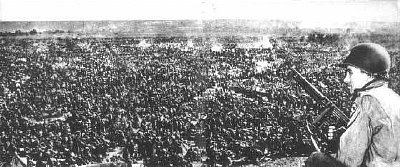
[back] Mass Starvation of Germans, 1945-1950 Eisenhower
Allied War Crimes 1941-1950
by Rixon Stewart
They say that the spoils of war go to the victors and that includes the opportunity to rewrite history from the victor’s point of view. This is particularly true of World War 2 where for the last fifty years one overall theme has dominated; namely that the allies were the good guys in contrast to the Germans who were Nazi war criminals. But was this really the case? Was the distinction so clear-cut or have we allowed Allied propagandists to reshape our view of history?
Until recently anyone who questioned this standard interpretation was immediately labeled a “revisionist” or worse still a “Nazi”: as happened to British historian David Irving recently. Yet with the passage of time a new perspective is beginning to emerge, one that is not so clear-cut in its distinction between good and bad.
When Germany surrendered in May 1945, the American Military Governor, General Eisenhower, sent out an “urgent courier” with instructions making it a crime punishable by death to feed German prisoners. It was even a capital offence to gather food together in one place to take to prisoners. The message reads in part:
“…Under no circumstances may food supplies be assembled among the local inhabitants in order to deliver them to prisoners of war. Those who violate this command and nevertheless try to circumvent this blockade to allow something to come to the prisoners place themselves in danger of being shot…”(1)
This was no idle threat. On July 31st 1945 Agnes Spira was shot by French guards at Dietersheim for taking food to prisoners. In effect this was a deliberate policy to starve the German prisoners of war. Many prisoners and German civilians saw American guards burn food that had been brought to the prisoners. According to one former prisoner who described it recently: “At first, the women from the nearby town brought food into the camp. The American soldiers took everything away from the women, threw it in a heap and poured gasoline over it and burned it.” (2)
In the chaos and confusion that followed Germany’s defeat at the end of the Second World War literally millions of Germans died. In an unprecedented humanitarian disaster an estimated sixteen million ethnic Germans fled their ancestral homelands in Poland, Hungary, Czechoslovakia and other parts of Eastern Europe to Germany. These were mostly women, children and elderly men who took to the open road before the advancing Red Army. Of these Canadian historian James Bacque estimates that between two and six million died in the process (3). Millions more died in Germany itself through a combination of disease, exposure and starvation, produced and compounded by deliberate Allied policies.
According to Bacque between 1941 and 1950 around one and a half to two million German prisoners of war died, whilst a further five million seven hundred thousand German civilians died between 1946 and 1950, largely, Bacque maintains, as a result of Allied policy. In all Bacques estimates that between nine and half and fourteen million ethnic Germans, German prisoners of war and civilians were to die in these iniquities. Part of the blame for this can be laid at the feet of Josef Stalin who, through his propaganda minister, Ilya Ehrenburg, actually encouraged the rape and degradation of the German civilian population.
“Kill, kill, you brave Red Army soldiers, kill. There is nothing in the Germans that is innocent. Obey the instructions of comrade Stalin and stamp the fascistic beast in its cave. Break with force the racial arrogance of the German women. Take them as your legal loot. Kill, you brave Red Army soldiers, kill!” Ilya Ehrenburg 1945.
Ironically, Ehrenburg, like Stalin himself, was Jewish.
However it was not only the Germans who suffered at the hands of Stalin’s victorious army, Russians did too; in particular the large Russian émigré population in Europe was to experience the depredations of the advancing Red Army. And in this regard the Russian Army was to receive help from an unlikely quarter. In an episode of infamy that has largely been ignored by the Western powers and their lapdog media Stalin was helped in an operation that has become known as one of history’s darkest episodes of betrayal: “Operation Keelhaul”.
"Starting in April 1945, the United States Army and the French Army casually
annihilated one million [German] men, most of them in American camps . . .
Eisenhower's hatred, passed through the lens of a compliant military
bureaucracy, produced the horror of death camps unequalled by anything in
American history . . . an enormous war crime."-- Col. Ernest F. Fisher, PhD Lt.
101 st Airborne Division, Senior Historian, United States Army
Sources:
1) Crimes and Mercies by James Bacque.
2) Ibid.
3) Ibid.
